|
|
|
Sort Order |
|
|
|
Items / Page
|
|
|
|
|
|
|
| Srl | Item |
| 1 |
ID:
095613
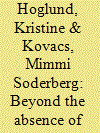

|
|
|
|
|
| Publication |
2010.
|
| Summary/Abstract |
This article introduces a novel way of conceptualising variations of peace in post-war societies. The most common way of defining peace in the academic literature on war termination is to differentiate between those cases where there is a continuation or resumption of large-scale violence and those cases where violence has been terminated and peace, defined by the absence of war, has been established. Yet, a closer look at a number of countries where a peace agreement has been signed and peace is considered to prevail reveals a much more diverse picture. Beyond the absence of war, there are striking differences in terms of the character of peace that has followed. This article revisits the classical debates on peace and the notion of the Conflict Triangle as a useful theoretical construction for the study of armed conflicts. We develop a classification captured in a Peace Triangle, where post-settlement societies are categorised on the basis of three key dimensions: issues, behaviour, and attitudes. On the basis of such a differentiation, we illustrate the great diversity of peace beyond the absence of war in a number of post-settlement societies. Finally, we discuss the relationship between the different elements of the Peace Triangle, and the challenges they pose for establishing a sustainable peace, as well as the implications of this study for policy makers concerned with peacebuilding efforts.
|
|
|
|
|
|
|
|
|
|
|
|
|
|
|
|
| 2 |
ID:
095611


|
|
|
|
|
| Publication |
2010.
|
| Summary/Abstract |
This article asks whether international law is moving towards a more unified constitutional order or whether differentiated types of constitutional processes are emerging. We study the sequencing and ratification pace of 32 'quasi-constitutional' international agreements containing procedural guidelines for inter-state relations and fundamental human rights provisions for individuals drawn up between 1945 and 2007. We do so in a comparative and quantitative fashion applying sophisticated statistical tools, namely event history techniques combined with counting processes. On the basis of our multi-treaty framework, the findings do not lend support to a unified and quick process of global constitutionalisation. Rather, they provide evidence for the idea of a 'multi-speed globe' of differentiated constitutionalisation. We also make a first attempt to study antecedents to global constitutionalisation. Our findings show that processes of global constitutionalisation vary across regime types and world regions (while there is no effect for new and old states).
|
|
|
|
|
|
|
|
|
|
|
|
|
|
|
|
| 3 |
ID:
095615
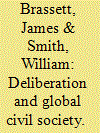

|
|
|
|
|
| Publication |
2010.
|
| Summary/Abstract |
The article provides a critical analysis of the role and function of global civil society within deliberative approaches to global governance. It critiques a common view that global civil society can/should act as an agent for democratising global governance and seeks to explore the importance of global civil society as an arena of deliberation. This more reconstructive aim is supplemented by an empirically focused discussion of the affective dimensions of global civil society, in general, and the increasingly important use of film, in particular. Ultimately, this then yields an image of the deliberative politics of global civil society that is more reflective of the differences, ambiguities and contests that pervade its discourses about global governance. This is presented as a quality that debates about deliberative global governance might learn from as well as speak to.
|
|
|
|
|
|
|
|
|
|
|
|
|
|
|
|
| 4 |
ID:
095617


|
|
|
|
|
| Publication |
2010.
|
| Summary/Abstract |
While there is much discussion of the need for democracy in transnational institutions, there is less discussion of the conditions for their democratisation. To address this deficit, a general account of democratisation is necessary. I propose that democratisation is dependent on the joint realisation of two conditions: communicative freedom and communicative power. Democratisation thus requires, first, publics and associations in which communicative freedom is realised on the one hand; and, second, institutions that link such freedom to the exercise of communicative power to decision making on the other. In order for these conditions to be met, civil society must be expanded into the public sphere. The transformation of communicative freedom into communicative power can be promoted only by institutions that recognise the decisional status of publics, which in turn depend on civil society to generate the deliberative benefits of the plurality of perspectives. Communicative power is not merely spontaneously generated through publics, but also through publics expressly formed through democratic institutional design.
|
|
|
|
|
|
|
|
|
|
|
|
|
|
|
|
| 5 |
ID:
095618
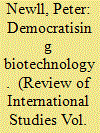

|
|
|
|
|
| Publication |
2010.
|
| Summary/Abstract |
There is now significant policy and academic interest in the governance of science and technology for sustainable development. In recent years this has come to include a growing emphasis on issues of public understanding of science and innovative processes of deliberative and inclusive policy-making around controversial technologies such as nuclear power and agricultural biotechnology. Concern with such issues coincides with rising levels of interest in deliberative democracy and its relationship to the structures and processes of global governance. This article connects these two areas through a critical examination of 'global' deliberations about agricultural biotechnology and its risks and benefits. It draws on an extensive survey concerned with the diverse ways in which a range of governments are interpreting and implementing their commitments under the Cartagena Protocol on Biosafety regarding public participation and consultation in order to assess the potential to create forms of deliberation through these means. The article explores both the limitations of public deliberation within global governance institutions as well as of projects whose aim is to impose participation from above through international law by advocating model approaches and policy 'tool kits' that are insensitive to vast differences between countries in terms of capacity, resources and political culture.
|
|
|
|
|
|
|
|
|
|
|
|
|
|
|
|
| 6 |
ID:
095616
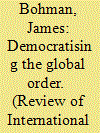

|
|
|
|
|
| Publication |
2010.
|
| Summary/Abstract |
While there is much discussion of the need for democracy in transnational institutions, there is less discussion of the conditions for their democratisation. To address this deficit, a general account of democratisation is necessary. I propose that democratisation is dependent on the joint realisation of two conditions: communicative freedom and communicative power. Democratisation thus requires, first, publics and associations in which communicative freedom is realised on the one hand; and, second, institutions that link such freedom to the exercise of communicative power to decision making on the other. In order for these conditions to be met, civil society must be expanded into the public sphere. The transformation of communicative freedom into communicative power can be promoted only by institutions that recognise the decisional status of publics, which in turn depend on civil society to generate the deliberative benefits of the plurality of perspectives. Communicative power is not merely spontaneously generated through publics, but also through publics expressly formed through democratic institutional design.
|
|
|
|
|
|
|
|
|
|
|
|
|
|
|
|
| 7 |
ID:
095619
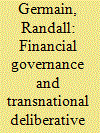

|
|
|
|
|
| Publication |
2010.
|
| Summary/Abstract |
Recent concern with the institutional underpinning of the international financial architecture has intersected with broader debates concerning the possibility of achieving an adequate deliberative context for decisions involving transnational economic governance. Scholars working within traditions associated with international political economy, deliberative democracy, cosmopolitanism and critical theory have informed this broader debate. This article uses this debate to ask whether the structure of financial governance at the global level exhibits the necessary conditions to support deliberative democracy. In particular, it considers the extent to which publicness and a public sphere have become part of the broader structure of financial governance. Although in some ways financial governance is a hard case for this debate, an argument can be made that a public sphere has emerged as an important element of the international financial architecture. At the same time, the analysis of the role of the public sphere in financial governance reveals important lessons which public sphere theorists and deliberative democracy advocates need to consider in order to extend their analysis into the realm of global political economy.
|
|
|
|
|
|
|
|
|
|
|
|
|
|
|
|
| 8 |
ID:
095614


|
|
|
| 9 |
ID:
095600
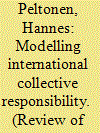

|
|
|
|
|
| Publication |
2010.
|
| Summary/Abstract |
Since its popular appearance in 2001, the responsibility to protect has gained wide attention. Yet, the meaning of responsibility in the R2P report has remained unexamined. The first task of this article is to conceptualise responsibility as it seems to arise from the R2P report. It is argued that the responsibility in the report is collective in nature, and analogous to obligations erga omnes and collective responsibility to extinguish fires before the institutionalisation of fire departments. The second task is to provide a model of collective responsibility with criteria that allow dividing the burden of fulfilling the common responsibility among the members of the collective. The model bridges the conceptual level with the level of practice.
|
|
|
|
|
|
|
|
|
|
|
|
|
|
|
|
| 10 |
ID:
095610
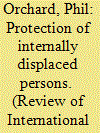

|
|
|
|
|
| Publication |
2010.
|
| Summary/Abstract |
Internal displacement is increasingly perceived as an international problem. This has led to suggestions that international norms have begun to govern state behaviour towards their own displaced populations. I argue that this change occurred through the innovative use of soft law, in particular the guiding principles on internal displacement, by a consortia of norm entrepreneurs including NGOs and a UN Office, that of the Representative of the Secretary-General for Internally Displaced Persons. As soft law, these principles lack the usual markers which suggest an emerging norm. Instead, the article argues that alternative methods - including the international recognition of the principles and their adoption in domestic legislation - has triggered a change in state behaviour. This is demonstrated by examining two cases of forcible return of IDPs - the closure of the Kibeho Camp in Rwanda in 1995, before the principles were created, and the closure of the Znamenskoye camp in Ingushetia, Russia in 2002, after their creation. Both situations are similar in that the norm appears to have been rejected - forced repatriation did occur. In the Russian case, however, government statements, along with widespread international condemnation of the closures, suggest rhetorical instantiation of a norm of non forcible return for IDPs.
|
|
|
|
|
|
|
|
|
|
|
|
|
|
|
|
| 11 |
ID:
095601


|
|
|
|
|
| Publication |
2010.
|
| Summary/Abstract |
In the absence of comparisons with prior episodes of transformative change in the history of the state system, contemporary debates on the long-term significance of the 9/11 terror attacks and the ensuing war on terror are in danger of polarising around opposing caricatures of epochal change and obstinate durability. The tendency to organise transnationally, mobilise along religious lines, and employ terroristic violence for the purposes of achieving far-reaching religious and political transformation of target societies is not unique to Al-Qaeda, but can be seen also in the activities of the militant confessional networks that flourished in Reformation Europe. By comparing the global struggle against jihadist terrorism with early modern European rulers' struggles against transnational confessional militants, I demonstrate that existing accounts of jihadist terrorism's transformative potential have been seriously mis-specified and require substantial revision.
|
|
|
|
|
|
|
|
|
|
|
|
|
|
|
|
| 12 |
ID:
095620


|
|
|
|
|
| Publication |
2010.
|
| Summary/Abstract |
It is often argued that multilateralism is no longer an effective mechanism to respond to global priorities and that more deliberative and multisectoral governance is needed. To explore this, the purpose of this article is to examine the practice of mutlisectoral deliberation within the Global Fund to Fight AIDS, Tuberculosis and Malaria and to determine whether it has resulted in providing a more deliberative response to global health priorities. To do so, this article will apply various theoretical arguments for deliberative democracy to the results of a four year study on the multisectoral organisation the Global Fund. By making links between theory and practice, the article will argue that the multisectoralism practiced by the Global Fund continues to suffer from a deliberative deficit and that it has not safeguarded equal stakeholder participation, equal deliberation between stakeholders or alleviate the asymmetric power relationships which are representative of current forms of multilateral governance. Nevertheless, by locating these gaps between theory and practice, it is possible to outline deliberative safeguards that might, if constitutionally enhanced, pull the Global Fund closer to its own normative values of multisectoral deliberative decision-making.
|
|
|
|
|
|
|
|
|
|
|
|
|
|
|
|
| 13 |
ID:
095612
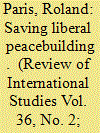

|
|
|
|
|
| Publication |
2010.
|
| Summary/Abstract |
Liberal peacebuilding has become the target of considerable criticism. Although much of this criticism is warranted, a number of scholars and commentators have come to the opinion that liberal peacebuilding is either fundamentally destructive, or illegitimate, or both. On close analysis, however, many of these critiques appear to be exaggerated or misdirected. At a time when the future of peacebuilding is uncertain, it is important to distinguish between justified and unjustified criticisms, and to promote a more balanced debate on the meaning, shortcomings and prospects of liberal peacebuilding.
|
|
|
|
|
|
|
|
|
|
|
|
|
|
|
|
|
|
|
|
|